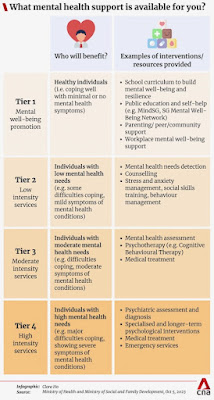I (volunteer) work mostly with old folks and all my training looks at sorting out living conditions, managing medical issues and palliative care. However, a lot of recent training in the past year also looks at mental health of the elderly. I work with old folks loads, so obviously I focus on identifying points of concern when it comes to mental wellbeing of the elderly.
That said, I'm not terribly sympathetic or empathetic. I don't need to be. I just need to be damn efficient in what I do for them — outlining the administrative things to secure subsidies, sort out medical appointments, and structure the palliative care that they need.
I'm not a very good listener. I can't just listen and not do anything. However, I've trained myself to understand that friends need a listening ear without me offering solutions or help. So I've learnt to be quiet and simply be there. But most friends know that I would do something if they ask.
In this op-ed by Dr Jared Ng published on Channel News Asia, 11 October, 2023, he opined that not every sad event in everyday life is a mental health disorder — 'Do you really have a mental disorder? Or are you just going through a tough time?'Mental health resilience isn't a new term. It's just something not talked about in every day conversations. However, more and more people are hit by burnout (at any age) and depression, or more people are talking about it. It can't be something we sweep under the carpet or tell people to 'get on with it' anymore. Chronic fatigue is a thing, and it's linked to ADHD and depression. It oddly hits many people under 35 years old.
I'm not going to say I'm okay if I'm not okay. But most times, I need to work out issues on my own, without the input from friends. I'm not in the biggest habit talking to people to resolve issues because I usually prefer to resolve them in my head, especially at this age. Hopefully, I screw up less at this age. Some tell me that it's dangerous to keep things in. But if I'm figuring things out, I can't have differing opinions or an opinion I can't appreciate.
We just have to bear in mind its potential for pitfalls. Misinterpretation of symptoms, the over-pathologising of normal emotional responses and confirmation bias can lead to inaccurate self-diagnoses, which in turn can result in unnecessary anxiety, delayed professional help, or inappropriate self-treatment.
Simultaneously, individuals may begin to perceive their emotional, psychological and behavioural responses only through a medical lens. While this can offer a form of validation and a structured approach to treatment, it can also potentially serve as a form of avoidance. By attributing all responses solely to an illness, individuals might inadvertently evade acknowledging and addressing challenging life circumstances or personal behaviour patterns.
It can become tempting, and seemingly easier, to blame a disorder for one's actions or feelings, rather than confront the underlying issues that may be at play.
Would I talk to a therapist if I need to? I suppose I would. An objective party would be able to contribute opinions or offer concrete help and point me in the right direction. That is if I need to restructure my life to feel happier and more productive. i.e. Like I sink into debt and need to get out of bankruptcy, and get a job, if I'm sick and need to re-organize finances to pay medical bills, or if I need to get a job at age 60 to supplement my income, or if I get scammed and wiped out my life savings, if I get a divorce and need to work out some things that a lawyer can't help with..., et cetera. I'm not mired in a situation of alcoholism and drugs. Hopefully never.
But if it's purely emotions based, then a therapist might not be clued in to my inner world. It would still be down to myself to get out of a funk or to turn things around. Getting a drink with a friend would be more helpful. I wouldn't even need to talk about things troubling me. I simply would prefer to have a chat and a few drinks, and that would be a way to de-stress, before regrouping to deal with what needs to be done.
It's good to know that we have a support network within the government agencies, should we need it. Psychiatric care and therapy aren't crutches, and they aren't something to be stigmatized. They're our aids to get through life in one piece without being too scarred. Other people's lived experiences won't be mine. Trauma can't be underestimated. Childhood trauma, in particular, lasts a lifetime and can dictate one's approach to life and reactions to many situations in adulthood. Even as adults, the cards Fate metes out to everyone is different. The pressure to hold a family together, to keep everyone safe and healthy, and hold down a job, mortgage, maintain friendships and social circles, etc, can be crushing.
There's a new national mental health and well-being strategy being rolled out. This new tiered care model is thoughtful. It tailors mental health services to the individual's severity of needs. It's to be encouraged, and in the face of tremendous pressure in day-to-day living, we should work out community concerns, and among them, mental well-being is at the forefront.
To enable early identification and intervention of mental health issues, more than 90,000 volunteers and frontline personnel from government agencies, community partners and mental health service providers have been trained in mental health awareness. These frontline personnel will also be equipped with skills to provide psychological first aid.
About 10,000 more frontline personnel will be trained in the next two years, while 1,500 frontline social service professionals will be upskilled, the press release said.


No comments:
Post a Comment